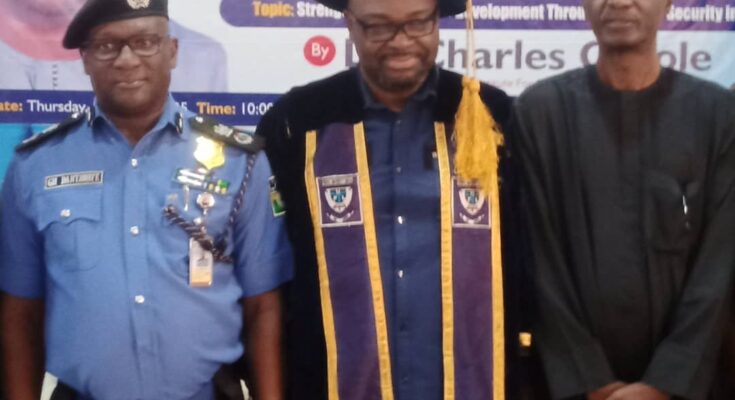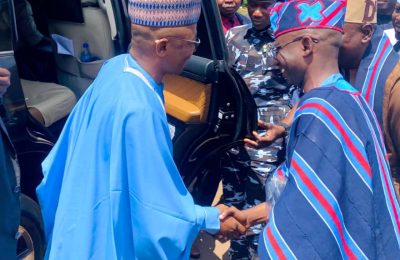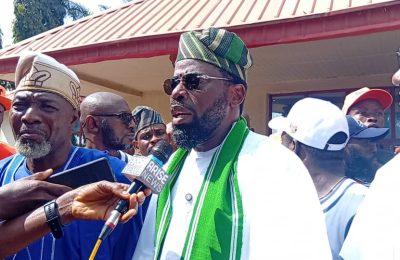The Nation has been tasked to formulate policies and programmes that will engender both National Security and national development as a panacea to the National security threats bedeviling the country.This was the fulcrum of the 17th distinguish public lecture delivered today by Dr. Charles Omole ,at the Federal University Lokoja with the theme: Strengthening National Development Through Effective Security in Nigeria, held inside the Dr. Joseph Makoju lecture theatre, Ful Lokoja.The guest lecturer, a former Director General of Institute of Security and Police Research and a security expert said it has become imperative for the country to prioritize policies on National security that will align with National Development aimed at giving confidence and state of ownership to average Nigerians in the nation building.He averred that the high rate of poverty , unemployment, Education and Nigerians lacking access to basic necessities of life is an invitation to socio-economic dislocation resulting to all kinds of insecurity, insurgency, banditry, corruption in low and high places .He posited that National Security should not be treated in isolation, as the nation must take cognizance of the underlying factors of economic, social and protection of lives and property of its citizens.The erudite scholar, noted that it is high time ,Nigeria begins to adopt non kinetic solutions to the lingering insecurity in the country by ways of providing good and sustainable governance at assuring the populace of their stake in the national project.He decried the current situation of the country in which majority of the citizens are facing multi dimensional poverty, lacking access to affordable education, employment, healthcare, clean drinking water ,foods, ethnic , religious dichotomy and widespread insecurity, is a trigger to disruption of national Security.He added that National Security should be a collective effort of all the citizens and as such their welfare and total well-being should be a priority of government to safeguard the nation from the misguided elements from within and outside the country.Dr. Omole noted that the country is entangled with the activities of Bokokaram , Islamic state of West Africa Province ISWAP who have perpetrated acts of militancy against social, governmental, and official institutions, especially in the North East leading to tragic outcomes.“The impact on the nation’s economy has been profound, marked by direct lossesin infrastructure, reduced agricultural production, and trade insecurity due topersistent attacks.“Violence in schools and the abduction of students, particularly the Chibok andDapchi girls, have resulted in students missing out on their education and, consequently, not acquiring knowledge, which adversely affects their futureearning potential in Nigeria. The humanitarian crisis is equally critical, as millions of people are displaced and reliant on assistance.“This situation onlyperpetuates poverty and dependency, significantly hampering regional andnational development‘ He said , banditry and kidnappings ransom , has become rampant in Northern Nigeria, posing a significant threat to human security and economic development who target their action on farmers, engage in cattle rustling, and kidnap residents for ransom even as these activities have compelled many farmers to abandon their farms, resulting in low regional yields and food scarcity” he stated.The erudite scholar hinted that these activities in Northern Nigeria diminishes investment in local economies, resulting in rising unemployment and poverty due to fears of insecurity, further exacerbating the development divide between the north and the safer south.He averred that aside from insurgency and banditry in the north ,resource crises, in the Niger Delta region, continue to threaten the Nigerian economy with resistance to the distribution of oil wealth, environmental pollution caused by oil processing, and a lack of basicinfrastructure and social amenities.“Terrorist organisations have sabotagedpipelines, threatened and kidnapped oil workers, and obstructed operations,resulting in losses amounting to billions of naira.This conflict diminishes government revenue and erodes the confidence offoreign investors, who view Nigeria as an unreliable business destination. Oilspills carry long-term social costs for the environment and development initiatives, including the destruction of fishing and farming livelihoods, leading to impoverished and discontented communities’According to him, the country’s weak cyber security is becoming a great concern tomost organisations,particularly those in the private sector, government agencies, and everyday individuals, who face cyber attacks, fraud, and data breaches.He added that if converted effort is not deployed, it will continue to undermine confidence in Nigeria’s digital economy and significantly hinder e-commerce and innovation, which are vital drivers of contemporary economic growth.He noted that corruption in the security circle has been worrisome as it incubates inefficiency and jeopardises national security in Nigeria, stressing that Government should take proactive measure to kick out embezzlement of funds,mismanagement of resources, and the diversion of funds intended for security operations” Soldiers and police personnel are frequently inadequately equipped, with many receiving significantly less than the official allocation.Moreover, the belief that security forces are corrupt profoundly underminespublic trust, reducing support for security initiatives. This also compromises the government’s ability to address threats and counter-insurgency challenges, as funds and resources are poorly allocated. Such inefficiency sustains insecurity and obstructs the government’s capacity to establish the crucial conditions for development”He urged government to tackle the menace by aligning National Security with National Development strategy to address the root causes of instability.He called on the government not be deterred by these activities, but to borrow a leaf from what some countries, such as South Africa and Ghana did when they were faced with similar situations with ours.Earlier, the vice chancellor, Prof Akinwumi Olayemi said, the University has institutionalised this lecture series as an avenue for intellectual discourse, where leading scholars and experts provide insights into issues of national and global importance.While commending the guest speaker, stated that the distinguish lecture series is aim to contribute to policy development, national dialogue, and sustainable development.




